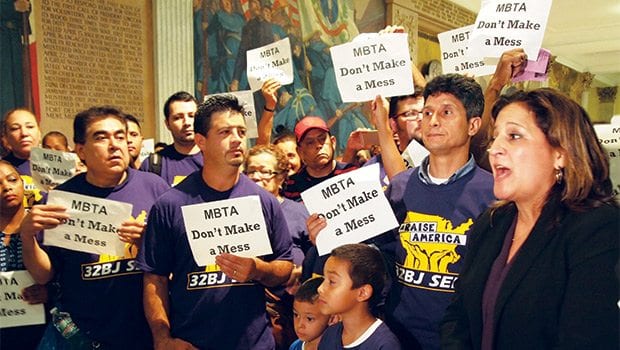
Members of the union representing MBTA janitors gathered in the State House last week to protest anticipated layoffs that could cut as much as one-third of the janitorial staff.
The MBTA is expected to have an approximately $100 million budget shortfall this year, Brian Shortsleeve, acting MBTA general manager, said earlier this month. MBTA officials intend to restrict spending to the two private firms with which it contracts.
Under the terms of the 2013 contracts, the MBTA was to pay approximately $36.5 million to ABM and S.J. Services. Instead, the agency has spent $53.1 million, representing a more-than 50 percent spending increase. S.J. Services’ president David Shea told the Herald that pulling costs back down would result in layoffs.
Roxana Rivera, vice president of Service Employees International Union 32BJ, said the union believes that up to 100 employees may be cut beginning September 1, although at the time of the State House protest, no number had been confirmed.
Rivera slammed the layoffs as too abrupt and drastic, saying they could cause a large number of janitors and their families suddenly to no longer be able to pay rent or maintain health care. She and others also said the plan might achieve savings only at the expense of service quality.
Should layoffs happen as outlined, “riders will clearly see and smell that mess,” she told reporters.
SEIU disputes savings
Union members argued that layoffs will not achieve the desired savings and efficiencies.
Rivera noted that these janitors are among the lowest paid MBTA workers, suggesting that budget relief would be limited. Under terms of a master contract, all SEIU janitors in the Boston metro area make $18 an hour, plus benefits, Eugenio Villasante, communication strategist for the union, told the Banner.
Additionally, she said, automation efficiencies are not an option for the cleaning work, thus a reduction in human labor entails a reduction in service.
“There’s no equipment that will help better clean stations,” Rivera told reporters. “You need bodies to clean. If you cut that deep, you’re not going to be able to make that work.”
The result, SEIU predicted in a press release, will be “grime-filled staircases, dirty walls, garbage-strewn stations and sticky floors.”
At a time when Boston’s population is growing, especially around transit hubs, the MBTA needs more, not fewer workers, Villasante told the Banner.
“This [layoff plan] is structured in a way that does not allow you to get the results you need,” Villasante said.
Ivan Correa, an 11-year MBTA veteran currently employed at Sullivan Square, Assembly and Wellington Stations, said workloads have been increasing and cleaners already are spread too thin. In the past, each janitor served one station. Now that number is up to two or three.
“As it is now, we are not doing 100 percent, because there is too much work,” he told the Banner in Spanish, with Villasante translating.
MBTA and contractors promise quality
Meanwhile, officials from the MBTA and one of the private cleaning firms said cleanliness would be maintained despite layoffs.
Shortsleeve said in a statement that the MBTA will not slacken its quality requirements as it tightens its purse strings.
“The MBTA is exercising an option under the originally negotiated contract and will continue to hold our vendors to the highest standards so our riders will be provided with a clean, comfortable and reliable transit system,” Shortsleeve, said in a statement.
David Shea, president of S. J. Services, expressed confidence that rider experience will not be impacted.
“S.J. services will meet or exceed all of the cleaning and safety standards in the contract,” without disruption, stated an S.J. Service press release.
“We have been successfully operating cleaning programs for the MBTA at stations and facilities for nearly 10 years so we are speaking from direct experience,” Shea said in the release.
As part of the company’s plan, S.J. Services said it would assign more workers to evening shift, using these times to tackle major cleaning tasks at garages, offices and stations, when fewer people occupy the spaces. The scheduling shift is expected to allow for greater productivity, while staff would retain daytime hours to empty trash and respond to cleaning emergencies, the statement said.
Responding to a Banner question, Rivera said it is a mistake to assume a janitorial scheduling model for offices can be applied to stations, which receive far more traffic and more intensive messes, such as feces, urine, hypodermic needles and vomit, which must be addressed promptly. Correa said it is useful as well to have janitors on hand for the tangential tasks brought to them, such as answering passenger questions about transit routes or local tourist activities.
Alternative plans?
Representatives Dan Ryan and Adrian Madaro at the State House gathering called for negotiations that included workers in the decision process. Rivera said other options exist for the MBTA, including sending out the cleaning contract for re-bidding. This, she said, would also require that effectiveness be examined alongside savings. SEIU representatives delivered a letter to Governor Charlie Baker’s office, requesting a meeting.




